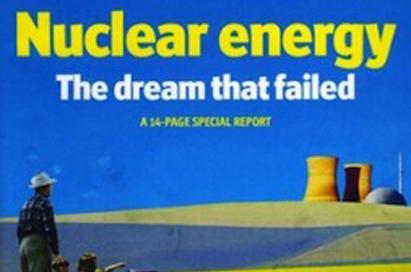The Necessity of Nuclear Power

September 13, 2013
In March of 2011, just days after the Fukushima Daiichi nuclear disaster, I met a Japanese family at Neuschwanstein Castle in Germany. We were waiting for the train to return to Munich when we struck up a conversation. They informed me that they lived in close proximity to the nuclear power plant and had left on vacation before calamity struck. Now, they were touring Austria and Germany and were unsure of what would greet them when they returned home. “I knew the plant was a bad idea. Nuclear power is so unsafe,” said the father. I was shocked. How could a plant have been built so close to civilians, endangering them and the entire environment? Back at home, I began to research the effects of nuclear power and found an important detail that many fail to comprehend: Fukushima’s power plant failure was elicited not by the unsafe nature of nuclear power, but by a vicious natural disaster.
A half-century ago, nuclear power was an environmentalist’s worst nightmare-unsafe, unreliable, and expensive. However, as The Economist reported in a special edition on the future of energy, times have changed and nuclear power has now become one of the keystones for the green movement. Nuclear power provides a realistic path for combating global warming by providing a reliable source of carbon-dioxide-free electricity without specific geographical conditions (like hydropower and solar power might require). James Lovelock, environmentalist and formulator of the Gaia hypothesis, says that nuclear power is the only possible way out of climate change.
Although nuclear power was once deemed too expensive for mass implementation, it now costs a mere 6.5 cents per kilowatt hour. Comparably, coal is 5 cents per kilowatt hour. But the price of coal does not take its destructive effects into consideration. For instance, due to public criticism, a coal plant was built at Moneypoint, Ireland in place of a nuclear plant. Activists viewed this as a victory, but since then, it has been determined that coal is the most hazardous fuel on the market. Coal pollution has contributed to more deaths than nuclear power in the past fifty years and that doesn’t even include its impact on global warming. Moneypoint has released millions of tons of carbon dioxide into the air since its launch.
In comparison, nuclear plants produce much more energy and release an insignificant amount of emissions. Adopting nuclear power means breathing cleaner air since carbon dioxide, greenhouse gases, and combustion by-products are not produced by nuclear power plants. According to the Nuclear Energy Institute (NEI), as of now, one-third of US energy is fueled by emission-free sources; nuclear power makes up 70% of this amount. In the United States, there are 104 reactors. The NEI reported that the volume of greenhouse gas emissions prevented at these facilities equal the total emissions produced by all vehicles in the United States. Today’s technology for nuclear energy proves safer than generating coal-based electricity.
As the United States experiences growth, our need for more energy is becoming imperative. It is predicted that by 2030, the United States will need 25% more energy to sustain its burgeoning population needs. Nuclear power is the only sustainable source that can easily meet this requirement and it already provides for 15% of the world’s energy. However, three decades after the Three Mile Accident-caused by mismanagement and negligence, Americans remain wary of nuclear power.
The Chernobyl disaster of 1986 claimed thousands of lives and is mentioned as a precaution each time the future of nuclear energy is considered. Yet, proper measures can be taken to ensure that death tolls are reduced and people are not exposed to damaging levels of radioiodine. We cannot continue to use Chernobyl as an excuse to not move forward with nuclear power. As David Grimes said, every form of energy production has an inherent risk and it is foolish to dismiss nuclear energy because of a psychological fear.
After the more recent Fukushima disaster, which rendered Osaka into a ghost town, Germany decided to set aside nuclear power and many other countries became increasingly apprehensive. This “ideological bias” of nuclear power as a means of impending devastation has affected people all over the world. This fear is understandable but superfluous, considering nuclear weapons require a very different process of development than nuclear energy. It is crucial to recognize that the Fukushima disaster that killed so many was triggered by a natural, not a nuclear disaster, caused by the Tōhoku earthquake and tsunami .
As a new generation takes the reins for a controversial and defining issue, the memories of these past incidents are finally fading. There are a rising number of environmentalists who believe that we should embrace the nuclear age. Technology continues to advance and it is said that the next generation of reactors will produce a maximum of one percent of the waste of the current reactors. Over three-fourths of France’s power has been derived from nuclear energy since 1963 and this has led to self-sufficiency, as well as granting the nation the cleanest air in the commercial world with the least amount of carbon emissions. Hopefully, other nations will be able to follow in their footsteps.
Nuclear energy is complex and does carry certain shortcomings, but it is safer and cleaner than other sources of energy. The Bureau of Labor Standards recently stated that it is safer to work in the nuclear industry than in the manufacturing sector and even the real estate and financial sectors. So in light of its potential for success, I strongly believe that the nuclear industry is a sector that will allow us to build a secure energy future.











